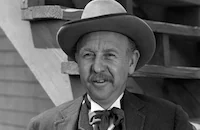Play Girl

Brief Synopsis
Cast & Crew
Frank Woodruff
Kay Francis
James Ellison
Mildred Coles
Nigel Bruce
Margaret Hamilton
Film Details
Technical Specs

Synopsis
At a winter resort in Lake Placid, New York, fortune hunter Grace Herbert is confronted by Joseph Shawhan, the father of her latest victim. Shawhan, a newspaper publisher, threatens to write an expose about Grace's reliance on breach of promise suits to finance her life unless she breaks her engagement to his son. After agreeing to Shawhan's demands, Grace, who is past her prime gold digging days, is admonished to settle down by her faithful maid Josie. Almost broke, Grace instead pawns her jewels to finance a new fortune hunt in Miami. There, she meets Ellen Daly when the young girl faints from hunger on her doorstep. When Ellen begs Grace for a job, Grace proposes that she teach Ellen to "manage men for profit" instead. After cementing their partnership, Grace decides to drive to Chicago, where she plans to introduce her surrogate to Bill Vincent, a wealthy older man. When their car breaks down along the highway, the women are rescued by Texan Tom Dice, who changes their flat tire. Tom, who is bound for Chicago to sell some cattle, suggests that Ellen meet him once they reach the city, but Grace disapproves of the "cowboy." In Chicago, Grace entices a reluctant Bill by promising to introduce him to her "little niece." Grace then coaches Ellen about how to handle the older man, and her strategy soon pays off with a shower of gifts and jewels. Grace's campaign culminates with her threatening Bill with a breach of promise suit and coercing him into writing Ellen a check for $50,000 to drop the suit. The three women then move to fresh hunting grounds in New York, where Grace introduces Ellen to the wealthy Van Pasen. While attending a concert with Van, Ellen meets Tom, who has come to New York for a cattlemen's convention, and the two begin dating. Grace disapproves of Tom's courtship of Ellen until she learns that the "cowboy" is worth $11,000,000. Grace's news about Tom's wealth upsets Ellen because she has fallen in love with him and is afraid of using him for his money. Consequently, when Tom proposes to her, Ellen runs away and Grace decides to land him on the rebound. One day, Van is taking a steam bath when he overhears Bill, who is visiting New York, lament about being taken by a breach of promise suit. Discovering that they have both been victims of Grace and Ellen, the two men visit Grace, who bamboozles them into paying her bills. After Grace pries a proposal from Tom, she is visited by his mother. Mrs. Dice informs Grace that although she is aware of her shady past, she will condone her son's marriage if Grace truly loves him. Mrs. Dice's benevolence forces Grace to recognize her own selfishness, and she finally tells Tom that Ellen is living in Miami and urges him to go after her. Touched by Grace's sacrifice, Mrs. Dice offers to introduce her to Tom's eligible bachelor uncle Fred.

Director
Frank Woodruff
Cast

Kay Francis

James Ellison

Mildred Coles

Nigel Bruce

Margaret Hamilton

Katharine Alexander
George P. Huntley
Kane Richmond
Stanley Andrews
Selmer Jackson
Marek Windheim
Charles Quigley
Georgia Carroll

Dick Hogan
Edward Dew
Oliver Cross
Gwen Seager

Boyd Irwin
Gayne Whitman
Theodor Von Eltz
Charles Flynn
Frank Meredith

Cecil Cunningham
Joey Ray
Doug Evans

Charles Arnt
Ralph Byrd
Crew
Jerry Cady
Albert D'agostino
Theron O. Kellum
Lee Marcus
Harry Marker
Nicholas Musuraca
Van Nest Polglase
Cliff Reid
Sam Ruman
Paul Sawtell
Darrell Silvera
Edward Stevenson
Vernon L. Walker

Film Details
Technical Specs

Articles
Play Girl
After testing a few other young hopefuls, the studio decided to borrow a contract player at Francis's old studio, Warner Bros., for the role of protégée Ellen Daley, who quickly learns the tricks of the trade but abandons gold-digging for true love with a handsome Texan. Mildred Coles was snatched from uncredited roles and bits to play her first major part on screen. It didn't catapult the former beauty queen to stardom, but she settled into what was for her a satisfying career, mostly in Westerns, before retiring from acting in 1948 at the age of 28. Francis wouldn't be far behind her, calling it quits in 1951 and living in relative obscurity for the next 17 years until her death.
Another career ending around the same time was that of Frank Woodruff, the director of Play Girl. His status as director of some very undistinguished and decidedly B pictures showed just how far Francis had fallen from her days as a leading lady in productions by the likes of Ernst Lubitsch, King Vidor, and Mervyn LeRoy. Woodruff's most memorable film was released later this same year: Lady Scarface (1941), a crime melodrama and tour-de-force for character actress Judith Anderson as a vicious gang leader, fresh off her Oscar®-nominated supporting role as the creepy and devious Mrs. Danvers in Alfred Hitchcock's Rebecca (1940). (Mildred Coles also had a featured role in Lady Scarface.) Woodruff made his last feature in 1944, worked briefly in television at the start of the 1950s, then left the business.
Play Girl was written by Jerome Cady, who went from Charlie Chan and Mr. Moto mysteries early in his career to scripting such top productions as Guadalcanal Diary (1943), Call Northside 777 (1948), and Henry Hathaway's Wing and a Prayer (1944), which earned him an Academy Award nomination. Cady's career also came to an early end; in 1948 he died from an overdose of sleeping pills on his yacht off Catalina Island. Another of the film's cast members, Nigel Bruce, best known as Dr. Watson in a series of Sherlock Holmes pictures, died of a heart attack in 1953 at the age of 58. Perhaps someone needs to investigate the "curse" of Play Girl?
Of all the film's performances, the standout--not surprisingly--is that of Margaret Hamilton as wisecracking maid Josie. She continued working until the age of 80, a prolific career that included the immortal role of the Wicked Witch in The Wizard of Oz (1939).
Play Girl was lensed by Nicholas Musuraca, who would work with Woodruff again on Lady Scarface, then go on to a highly acclaimed career as cinematographer for several film's in Val Lewton's legendary horror unit at RKO, including Cat People (1942), The Seventh Victim (1943), and The Curse of the Cat People (1944). He also contributed greatly to the memorable look and mood of the thriller The Spiral Staircase (1945) and such notable film noir releases as Out of the Past (1947), Where Danger Lives (1950), and Fritz Lang's The Blue Gardenia (1953).
Play Girl's premise and plot were slammed by the British press as "unmoral," and some American religious figures said that Francis's profession and her tutelage of Cole bordered on an endorsement of prostitution. The only thing that allowed it to escape from close scrutiny by the Hays Office was its low status as a throwaway programmer. Unlike other morally questionable characters of the time, who had to be suffer for their crimes and sins, Francis's punishment in this was merely the ravages of time--and here again, only in Hollywood would pushing 40 be considered a suitably harsh sentence for a woman.
Director: Frank Woodruff
Producers: Lee S. Marcus, Cliff Reid
Screenplay: Jerome Cady
Cinematography: Nicholas Musuraca
Editing: Harry Marker
Art Direction: Van Nest Polglase
Original Music: Paul Sawtell
Cast: Kay Francis (Grace Herbert), James Ellison (Thomas Elwood Dice), Mildred Coles (Ellen Daley), Nigel Bruce (William McDonald Vincent), Margaret Hamilton (Josie).
BW-77m.
by Rob Nixon

Play Girl
Quotes
Why, she's said goodbye to more men than most women have said hello to.- Josie
Trivia
Notes
The working title of this film was Debutantes, Inc.. According to a news item in Hollywood Reporter, Sheila Ryan and Elyse Knox were tested for the role of "Ellen Daly." RKO finally borrowed Mildred Coles from Warner Bros. to play the role of "Ellen."














